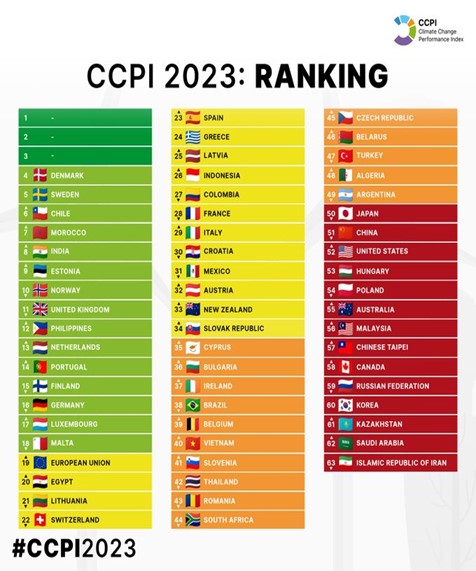PREVIOUS
Climate Change Performance Index 2023
November 22 , 2022
864 days
1109
0
- It is compiled by three environmental non-governmental organisations – German watch, New Climate Institute and the Climate Action Network.
- It is an independent monitoring tool for tracking the climate protection performance of the European Union and 59 countries.
- Together the European Union and 59 countries in the CCPI 2023 account for more than 92% of the greenhouse gas (GHG) emissions in the world.
- The rankings are based on how well the countries are doing to halve their emissions by 2030.
- The report leaves the first 3 places empty as "no country performed well enough in all index categories to achieve an overall very high rating".
- It puts Denmark in fourth place, followed by Sweden and Chile.
- Iran, Saudi Arabia and Kazakhstan fared the worst.
- In the CCPI 2023, India rose two spots to rank 8th out of 63, due to its low emissions and the increasing use of renewable energy.
- The report said India is "on track" to meet its 2030 emissions targets.
- However, the renewable energy pathway is not on track for the 2030 target.
- India earned a high rating in the GHG Emissions and Energy Use categories, while it got a medium rating in Climate Policy and Renewable Energy sections.
- Since the last CCPI, India has updated its Nationally Determined Contribution (NDC) and announced a net-zero target for 2070.
- The report noted that India is among the nine countries responsible for 90% of global coal production and it also plans to increase its oil, gas, and oil production by more than 5% by 2030.
- Since the last Climate Change Performance Index, India has updated its Nationally Determined Contribution (NDC) and has also announced a net-zero target for 2070.
- Net Zero means achieving the balance between the greenhouse gases put into the atmosphere and those taken out.

Leave a Reply
Your Comment is awaiting moderation.


